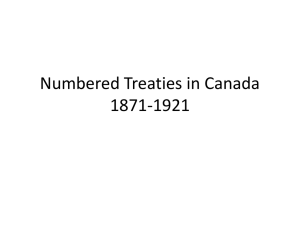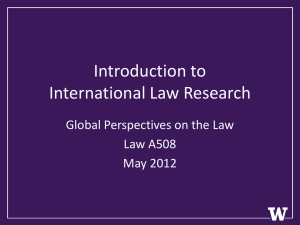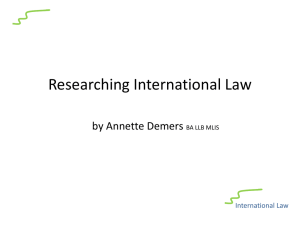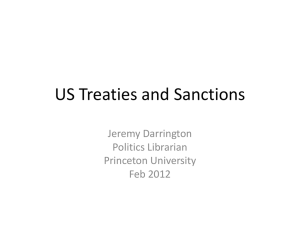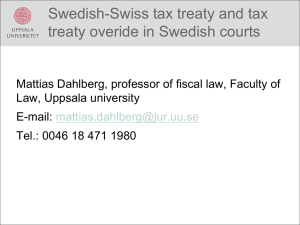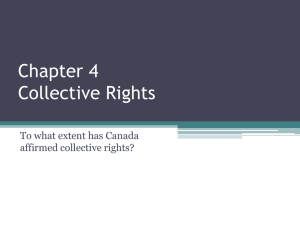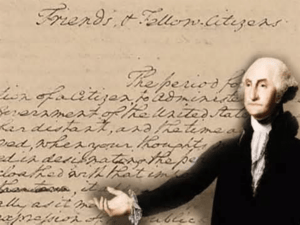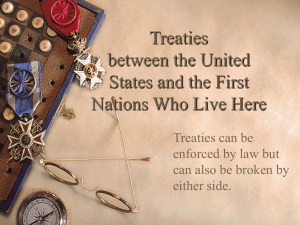Why Do the United States Conclude Tax Treaties?
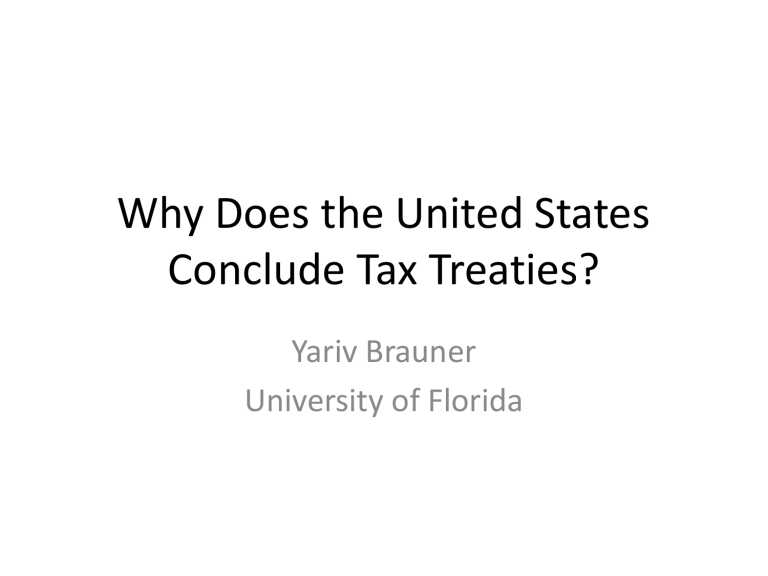
Why Does the United States
Conclude Tax Treaties?
Yariv Brauner
University of Florida
Introduction
• Legal status of tax treaties
• Background – the negotiation process
• Basic Policy
• Concise history
• The decision to negotiate / conclude a treaty
• The contents of tax treaties
• Policy conclusions
Legal Status
• (Tax) treaties and statutes are both “the law of the land”
– i.e., no superior status to tax treaties
– Treaty override possible and used in practice
– The courts soften the conflict - possibly eliminating inexplicit/unintended override
• Treaty override controversial, yet little consequence in reality
– Justified as mostly targeting domestic abuse
– Other countries join the United States in practice
Background
• Long (several years) and non-standard process
• Secret and uncontrolled
– Senate’s advice and consent being the sole effective control
• Doubts about the existence of clear treaty policy and a serious tax policy discourse generally within the Treasury department
(executive branch)
– General discomfort of Congress with tax treaties
• that are difficult to amend, while domestic law changes at least on an annual basis
• That depend on incomplete information about the treaty partner and lack of political control over the process
– Experts: No serious and open discussion between Congress and the
Treasury about the goals: what is “good” for the American people?
– No evidence on coordination of statutory and treaty tax policy
Basic Policy
• Acceptance of the rules of the game, with some
U.S. accents
• Negotiating team follows the published “U.S.
Model, accompanied by a technical explanation
• Resembles the OECD Model
– Saving clause
– Effective management does not dominate the corporate residence rules
– Limitation on benefits
– More extensive exchange of information
– No tax sparing
Concise History
• Active in the League of Nations’ work (1920s)
• First tax treaty concluded with France (1935)
– Followed by Canada (1937) and Sweden (1939)
• Post WWII – first Northern Europe (and NZ)
– Then – more Europe, Australia, S. Africa, others..
– End 1950s – Africa and Caribbean nations
– 1960-1974 – only Luxemburg + terminations
– End 1970s – More Europe + Korea
• 1980s-present – slow pace of additions / Africa and
Caribbean terminations
• Very few in Latin America and Africa, otherwise almost complete coverage of important trade partners
The Decision to Negotiate / Conclude
• Foreign policy
– Politics
– Defense
• Economic policy
– Major trade partners
• Relevance of actual trade relationship
– Impact of lobbying / particular interest groups
• Investors prefer a “treaty in place”
– Position
• The U.S. is now a net capital importer
• The U.S. is a less dominant capital exporter / price maker
The Content
• Rosenbloom: policy designed in the 1960s
– Based on the choice of residence based taxation, compatible with the position of the U.S. as a large net capital exporter
• Maximal reduction of withholding tax rates
• Each treaty a separate, independent contract – no consistency or comprehensiveness concerns
• Focus on U.S. taxpayers – unwillingness to grant significant advantages via treaties [and primary worry from abuse of treaties by them – less worried about foreigners taking advantage of U.S. treaties – Y.B.]
• Recent policy
Clear, Coherent and Transparent Policy?
• Instinctively, we are attracted to it – especially academics - yet, maybe practically it is not desirable?
• Transparency dismissed as bad for negotiation
– Yet, the U.S. Model is public
– And, changes in policy may be referred from other treaties that are public
• Standardization
Conclusion
• Decision to negotiate
• Process standardized yet not studied
• Separate from decision to conclude
– The Model
– The international tax regime
• Senate oversight
– Other political constraints
• Maintenance
• Personal aspects
• Resources
• Unclear goals
Brazil – United States Tax Treaty
• History
– Mutual suspicion
– Tax sparing
• But, nowadays, Brazil is left essentially alone among our most serious trade partners without a treaty
• Why?
• Traditional reasons to conclude
– Foreign policy
– Politics
– MNEs interests
– Economic policies
Brazil – United States Tax Treaty (cont.)
• Other reasons
– Association of productive countries
– Eliminate disincentives that we do not believe in anyway
• So, why not?
– Insistence on tax sparing
– Trust, cooperation
• Exchange of information
• Bank secrecy
– Brazil’s independence from OECD hegemony
Tax Sparing and Matching Credits
• Goal: support tax incentives of a developing treaty partner
• Consistent U.S. policy
• Reasons
– Tax treaties should not affect U.S. taxation of U.S. citizens and residents
– Tax treaties inappropriate mechanism for economic assistance
– Incompatible with CEN based FTC
• FTC as an extraordinary benefit
• Difficult to operate in compatibility to domestic tax law and third party treaties
Tax Sparing (cont.)
• Critique of the support of tax incentives
– Theoretically weak story
– Generally granted, cannot be fine-tuned
– Opaque and unstudied policies
– Device of tax competition
– But, this critique may be viewed as paternalistic
• Indeed, opposition by international institution ineffective
Tax Sparing (cont.)
• Critique of the practice of tax sparing
– Dependent on treaties with no reason
– No coherent policy as for who gets it and who does not
(arbitrary), but no “give and take”
– No thought of realistic “triangular cases”
– No reliable and honest data on effect
• No attempt to seriously study efficacy
• Similarly to the corollary of tax incentives, no mechanism of control, duration, etc..
• Also, tax planning that achieves the same result is available
– This goes against the important U.S. principle of anti treaty shopping despite LOB
– May help the wrong taxpayers (e.g. MNEs with excess credits..)
• May be beneficial to developing countries (i.e. counterproductive..)
Tax Sparing (cont.)
• Realistically, the claim in support of tax sparing is a call for a reform of our international tax regime
• I am sympathetic to the desire to control a divided, agreed upon part of the relevant tax base
– This is the heart of the formulary apportionment reform I support
• Considered radical, yet not legally impossible even in the particular context of one treaty only
– Although this may be “too much” politically
– I am not sure that the “exemption” solution is easier to implement politically
• And, is inferior from third treaties perspective
The downside of not having a treaty
• It is not so difficult to treaty shop – few pay full tax price
– Wasteful
– Goes against a principle that may be more important than not allowing tax sparing – the elimination of tax avoidance and treaty shopping
Conclusion
• Grim picture of stubborn conservatism
– Demonstration of the harm of standardization and the model based approach
• In the current frame work Brazil’s insistence on tax sparing is misguided
• Brazil is in a unique situation to lead the developing world in negotiation of a treaty
– Exemption solution
• Current appeal: calling the bluff
– Exploring a margin for negotiations

